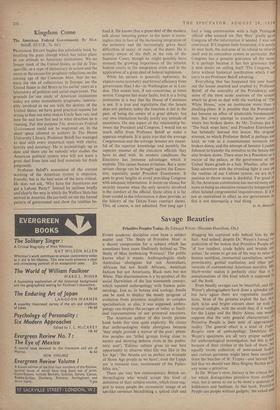Kingdom Come
The American Federal Government. By Max Beloff. (O.U.P., 7s. 6d.)
PROFESSOR BELOIT begins this admirable book by recalling the great change which has taken place in our attitude to American institutions. We no longer think of the United States, as did de Toc- queville, as a type of democracy in action and the cause or the excuse for prophetic reflections on the coming age of the Common Man. Nor do we, since the rise of collectivism in Europe, see the United States as did Bryce in his earlier years as a laboratory of political and social experiment. The grounds for our study of American institutions today are more immediately pragmatic; inextric- ably involved as we are with the destiny of the United States, we have good practical reasons for trying to find out what makes Uncle Sam run, and how far and how fast and in what direction he is running. For this purpose The American Federal Government could not be improved on. In the short space allowed to authors in The Home University Library, Professor Beloff has managed to deal with every important topic with clarity, brevity and accuracy. He is astonishingly up to date and there can be nobody who studies the American political system who will not learn a great deal from him and find materials for fresh judgments.
Professor Beloff's assessment of the current working of the American system is objective, friendly, but in the best sense of the term critical. He does not ask, 'Why have the Americans not got a Labour Party?' Instead he outlines briefly and clearly the way in which the Welfare State has arrived in America. He can both set out the formal pattern of government and show the realities be- hind it. He knows that a great deal of the modern talk about restoring power to the states is mean- ingless cant in face of the increasing integration of the economy and the increasingly grave fiscal difficulties of many, or most, of the states. He is acutely aware of the shift in the role of the Supreme Court, though he might possibly have stressed the growing importance of the inferior federal courts in the integration crisis and in the application of a great deal of federal legislation.
While his picture is generally optimistic, he expects more symmetry and formal efficiency from government than I do—in Washington or in Lon- don. This makes him, if not censorious, at times severe. Congress has many faults, but it is a living institution in a way that the House of Commons is not. It is true and regrettable that the Senate does not perform today the function it did in the past, of being the centre of a great debate; but our own institutions hardly justify anyattitude of snootiness. On one aspect of the relationship be- tween the President and Congress, I would not so much differ from Professor Beloff as make a separate emphasis. It is quite true that the average Congressman and the average Senator are resent- ful of the superior knowledge and possibly the superior manner of the executive officials they have to deal with. In modern conditions the Executive has immense advantages which it exploits. This causes human irritation. But a more serious charge can be brought against the Execu- tive, especially under President Eisenhower. It goes to great lengths to avoid providing Congress with adequate information. It insists on silence for security reasons when the only security involved is the comfort of the official. Quite often it is far from candid in the information it does provide, as the history of the Dixon-Yates contract shows. This, of course, is not admitted. Not long ago I
had a long conversation with a high Pentagon official who assured me that 'they' gladly gave Congress all the information it needed. I was not convinced. If Congress feels frustrated, it is partly its own fault, the outcome of its refusal to reform itself and its committee system in particular. But Congress has a genuine grievance all the same. It is perhaps because it has this grievance that it now insists on calling itself 'The Congress.' a form without historical justification which I am sorry to see Professor Beloff adopting.
Everything that has happened this year bears out the lesson asserted and implied by Professor Beloff, of the centrality of the Presidency; and some of the most acute analyses of the system which he gives us deal with the working of 'The White House,' now an institution more than a dwelling-place. It is possible that the Presidency has become an office of intolerable burdensome- ness. But every attempt to transfer power else- where has broken down. As Mr. Truman put it 'The buck stops here,' and President Eisenhower has belatedly learned this lesson. His original attempt, to which professor Beloff is perhaps too kind, to rule as a constitutional monarch has broken down, and the attempt of Senator Lyndon Johnson to transfer the initiative to the Senate has also broken down. There must be a President or a mayor of the palace, or the government of the United States grinds to a halt. Whether, after our Suez adventure with the revealing light it cast 00 the realities of our Cabinet system, we are in a position to throw stones is doubtful. For good or ill, the American constitution has moved more and more to being an executive monarchy tempered by often belated congressional inquisitiveness. If it is not as centralised in effect as our government IS' this is not necessarily a bad thing.
D. W. BROGAO














































 Previous page
Previous page